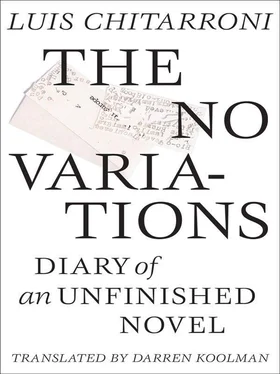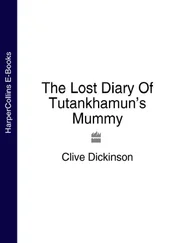Alina, he recalled at the wake, was more than just a stockpile of euphemisms and abstruse paraphrases: she’d been the one to instigate his habit of collecting, beginning with words and sayings in various languages. And she, the weaver of his destiny from the following day onwards, was responsible for uttering what he deemed an unrepeatable insult: “Mr. Mies has his quincunx aspect badly disposed.”
Later, when he was moving in more lofty circles, pushing his luck amidst the movers and shakers of the Buenos Aires elite, Gabriel Donovan would often repeat the story, but censored himself from uttering those secret foreshadowings his overactive infantile brain once associated with that word, as if the uncertain and the certain had, in the intervening years, become equally demonstrable, equally representable, as a blank page and a written page; or an arrangement of dots and an exhaustive interpretation of those dots. So he presented the story as a comedy of errors, and his vaguely astrological quincunx took on the significance of a Jewish prepuce, his sexuality cold-blooded, reptilian, for there was a weakness in the susceptibility to derive pleasure from a woman’s body, immorality in that for which he was once grateful, now the quincunx became a shibboleth he couldn’t pronounce, a goddamned reminder of his former self … [a reminder of the one that held the sword above his head] Reread Cavafy
Mr. Mies was a Dutchman who stayed in the barn at the back of the Donados’ house (which, GD found out years later, was also where the bonetudos kitted themselves out [where they stored their facemasks, their wagons]). The first time he saw him he was chewing on the bit of his bubble pipe
He was amused that his close friends were so amused by his “bad quincunx aspect,” although they were guilty of their own blind superstitions, which was reflected in the books they read, books by authors as important to them as any on the university curriculum (Arendt, Sontag). He himself enjoyed a semester under the saturnine influence of various authors … There was an astrological clique emerging in his circle of university friends, and he felt he had no choice but to go along with it. “Saturnine” is a reference to the editor, Saturnino Calleja. But it wasn’t really a case of peer pressure. He always reserved a hint of admiration for those who can spell and who respect the basic rules of grammar.
They interrogated him about the bonetudos and he gave them away. Now that he’d moved up in the world, he didn’t care. He also wanted to know the names of those involved in the conspiracy against D.
Before going to bed, and before making what he called a “moral choice,” he recited “Prayer Before Birth,” by Louis MacNeice
Anagrams, pangrams, double acrostics …
[Arribalo, Barriola, Donado, Ventimiglia] the Andovers’ residence with his girlfriend, a young woman (daughter of Ventimiglia Donceles, the singer — remember?) who was very much in love with him, and an avid reader of everything he wrote. And he wondered, but refrained from asking aloud … How could she be in love, the only condition for which reciprocation isn’t a law …?
Combine hearing / / Conversation
— She’s in love with him because he writes.
— Does he write so well?
— For sure. She reads everything he writes.
And then he asked himself …
Conversation with the editor .
— It’s Balmóral, everyone pronounces it wrongly. I’m surprised at you.
The aunt. Everyone was living in a state of shock. Shock that overrode the fear.
After returning from his last trip, he saw his door had been forced open. He was [NOt]
surprised at what was taken [by those freaks]. He knew what they were looking for. Honor among thieves .
He stepped over the threshold and tripped over the books from his last trip, still wrapped in a Galignani bag. Jet-lagged, he moved through the house with a weary contempt of the all-too-familiar. He was humming a song.
In the bathroom, he found the dog-eared though still unread journal he bought on the train from that youth who reminded him of George .
End of P, bad marriage to an awful girl. Chesterton’s biography of Chaucer: William Morris’s edition of Chaucer’s works. The smell of cat piss hit like a brick wall. At least other urine smells only erect a semi-permeable barrier. And having some way through is always better than having none. He had to get rid of his slithering, reptilian comparisons: repudiate them. And he was here. There .
A not-unexpected death begins the story (disease, obviously)
The three factors. The conversation in which we learn: X is the accountant’s daughter’s boyfriend. The house broken into during a trip to Europe. The angelic girl in the Pallemberg bookstore. Passing by a poster of Belgrano in Peru (“The House on calle Piedras,” “Replicas”)
A lengthy tribunal negotiation (on the same day Luini saw him) concerning the movement of the inheritance southwards, which couldn’t happen until after July 9 …
[Eiralis sets the date … in the preface or the letters?]
Luckily he liked walking …
So that he went down, as he liked to say, as he liked to believe, for Esmeralda, then he got to Piedras — with the cars and buses before him, daring him — and he got as far as Carlos Calvo, at which point he doubled back.
Include the booksellers in “Early”
Accents has the original strip of paper [a valuable addition to my bibliophile’s treasury], which contains a false enthymeme or [involuntary] syllogism:
“A completely original work that will endure in the memory: all its readers will be friends of the author and one another and so complicit in ensuring its endurance.”
I’d already managed to acquire some gems in that unassuming bookstore with its unprepossessing old proprietor. Most were on the tables with the other cheap books, but, occasionally, there were one or two great volumes to be found on the shelves. Of course, they’d remain there unsold for several months before being demoted to the plebeian tables. Some of my best friends were witness to the regularity of this process. The most observant of them called the period of caducity “the fall,” and he’d usually announce its arrival out loud. But it was still the middle of spring. Behind me, the two sisters and heirs of the establishment were conversing — a pair of redheads who looked like they came out Dante Gabriel Rossetti via Zwi Migdal or the Warsaw Ghetto. They were speaking in intricate detail about some family matters. But there was an anger or furor in their voices (perhaps they were just being loud) about information one wouldn’t expect two siblings to disagree about. The indirect way they related that information didn’t help, but any auditor would find it hard to believe that two sisters who spent nearly every waking hour together for the better part of fifteen years, would be ignorant of their father’s eye color, the ages and genders of their cousins, or the fact their mother was bald. But I swear that this was the nature of their exchange.
That day, each of them discussed how much they disliked the noise and heat of their respective houses, in the process of which they gave away not only their addresses, but how long they’d been living there, how many rooms they had, the location of the television, etc.
I thought that if this absurd display was practiced, merely an exercise of redundant communication intended for the casual listener, then I should demand a refund for those four issues of Accents I bought (the most recent hidden under the ponderous weight of a copy of Papini’s Final Judgment ), the contents of which were lame by comparison; but if they weren’t practiced, intentional, then I regret having admired their pleonasms and redundancies for as long as I had, which seemed to go on for as long as I’d been in possession of a mortal coil.
Читать дальше












